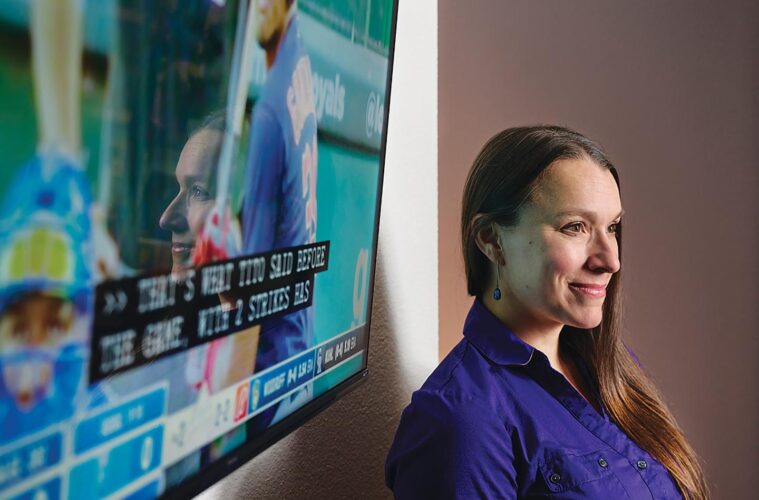On June 25, 2009, Stephanie Veverka ’04 was watching a live newscast when the devastating news broke: Pop superstar Michael Jackson had died at age 50. As a voice writer for the National Captioning Institute (NCI), it was her job to repeat the news into a microphone to be converted into television captions for viewers to see. “That was an emotional one,” Veverka remembers.
Veverka got her start at NCI in 2007 when she answered an online ad for a voice writing position. “It’s like the clouds parted and the light shone down on my laptop,” she says. Her early work at NCI focused on creating closed captions for live television broadcasts. For nearly a decade, this was Veverka’s day-to-day process: She would watch a live broadcast, such as a baseball game on the MLB Network or a politician’s speech on C-SPAN. In real time, she’d repeat back the sports commentary or political speech that played through her headphones, making sure to speak clearly and vocalize punctuation. Using NCI’s captioning software, those words were transcribed and transmitted to the channel’s video signal, appearing seconds later on screen for viewers. “What really fascinated me about this is that it combined [my] love of language with the challenge of a live environment,” the Colgate English major reflects.
Now, as director of production, it’s her job to ensure that NCI moves forward with the growing demand for captioning. “I was hired to be working with words all the time and creating the captioning, but I am now working with the overall operation of the business and trying to grow us, especially as the general industry of media is really blossoming with streaming content of all kinds,” she says. “Companies are taking their meetings from the boardroom to the Zoom room, and they want those meetings captioned. Participants deserve to have them captioned.” Learn more about Veverka’s work at NCI.
Giving Access
Providing viewers with access to information is one of NCI’s tenets: “Access to information is important for everyone,” Veverka says. “For life decisions. For health decisions. For political decisions. Everyone has the right to be informed about what is going on in the world.”
Handling Emotional Content
Like anyone else, NCI captioners bring their own opinions and experiences to the table. “When you are captioning the news, or even if you are captioning your sports rival, it can be very emotional. And still you have to stay focused and fulfill that mission of making each moment of this event objectively accessible through closed captioning.”
Taking Care of Your Voice
At NCI, your voice is your most important instrument. And to take care of your voice, you have to think of the whole package, Veverka says. During a long day of captioning, the company schedules off-air breaks for voice writers: “That’s not only to give our brains a break, but also to give our bodies a break, to give our voices a break.”
This was especially needed at the beginning of the COVID-19 pandemic, when voice writers were working around the clock to deliver public health information to audiences nationwide. “We had to be sensitive to that and invite people to be honest with us if they were feeling burned out…. It took a toll on some of our captioners.”
The Circle of Life
Once, Veverka had the chance to provide a voice to her inner child when she captioned a show for public television about the Lion King. “I was able to caption the lyrics to the song they were playing during the show, flawlessly, because I knew them by heart.”
The Future of Captioning
NCI has recently added automated captioning to its services, which doesn’t require voice writer involvement. “While that can feel threatening to the human, it is also the way our captioning is going to grow with the demand of the industry,” Veverka says. And that demand is high: According to a recent survey by Stagetext, four out of five viewers (ages 18–25) use subtitles all or part of the time. A similar study by Netflix found that more than 80% of members used subtitles or closed captions at least once a month.
Did You Know? “In early captioning years, someone used to physically go down to the White House, get the speech, find a pay phone, and read it while being recorded,” according to the NCI website.

